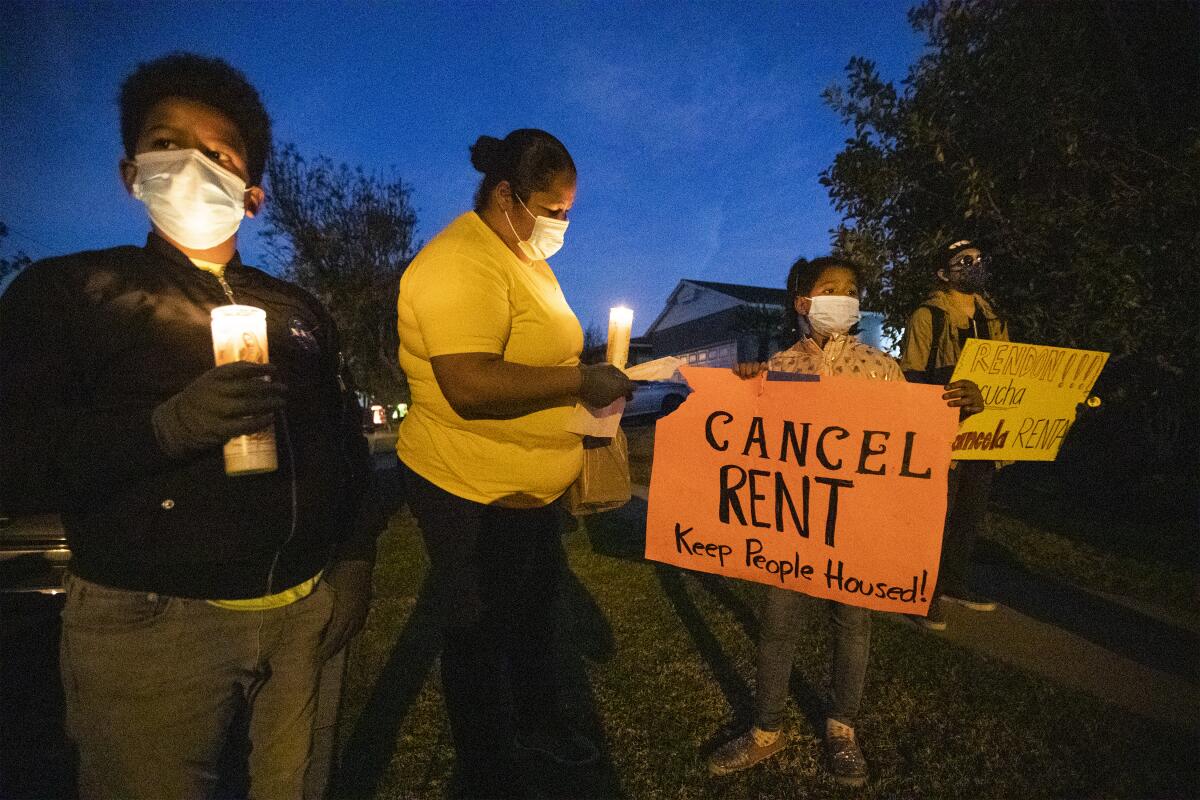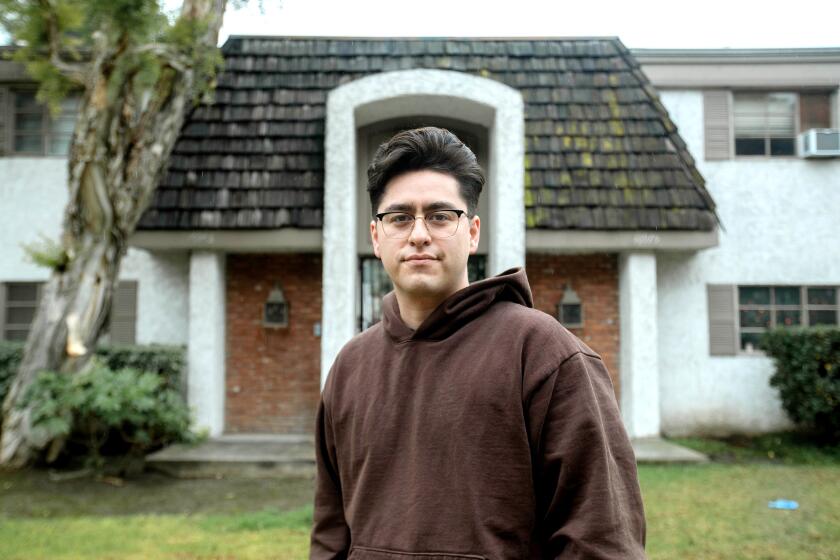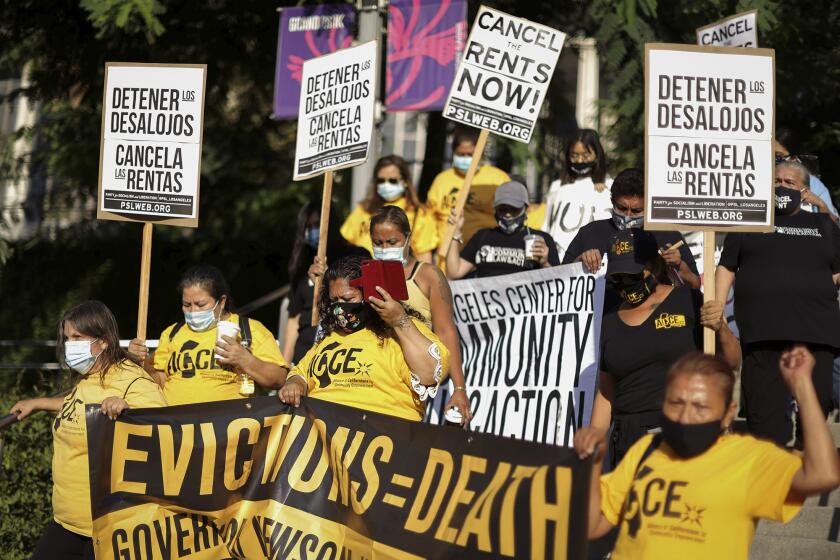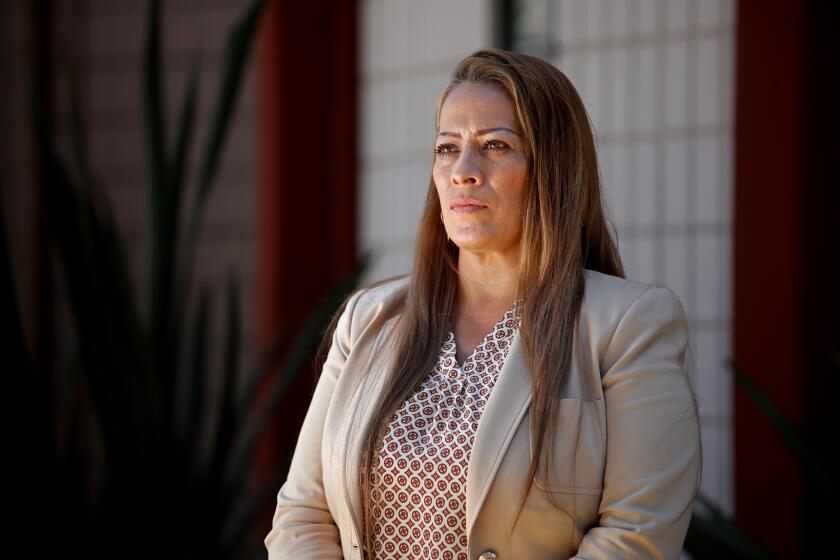L.A. plans end to COVID-19 protections against evictions, rent hikes

- Share via
Los Angeles may wind down many of its COVID-19 protections against evictions and rent increases by January, ending what has become some of the nation’s strongest and longest-lasting tenant safeguards during the pandemic.
Starting in 2023, landlords will once again be allowed to evict tenants for not paying their rent even if they’ve fallen behind for COVID-19-related circumstances, under a proposal released by the city housing department last week. The plan also calls for tenants living in rent-controlled apartments in the city — about three-quarters of the apartment stock — to once again face rent increases the following year, in January 2024.
“As we recover to a new normal, the city must provide clarity to both landlords and renters on the timeline when current and past-due rent must be repaid and temporary eviction restrictions lifted,” the report reads.
As part of its COVID-19 rules, the city of Los Angeles is prohibiting rent increases for tenants in rent-controlled buildings. Elsewhere rents have gone up by double digits in recent months.
If passed by the City Council, the proposal would put L.A. back in line with many cities in California and across the country that have repealed or let expire renter protections enacted when the pandemic began in spring 2020. At the time, citing the risk of widespread homelessness because of COVID-19’s economic damage, local, state and federal leaders passed a battery of rules against evictions and rent hikes.
But Los Angeles’ rules are rare both for their strictness and how long they’ve lasted. If the proposal advances, tenants in rent-controlled apartments will have had no rent increase for almost four years by the time they’re allowed again in 2024. And tenants who fell behind on rent during the pandemic will have at least until August 2023 to repay what’s owed.
Dan Yukelson, head of the Apartment Assn. of Los Angeles, said that the city’s rules have been “far worse than any others” in the region. Many landlords, he said, don’t expect to recover past-due rent debts, and have been struggling to keep up with rising city fees and inflationary-driven maintenance costs in recent years.
“It’s very easy for the city to push this on the backs of landlords and have them suffer longer and be responsible for the entire support system for these renters,” Yukelson said. “It’s not fair.”
He said he was relieved that the city was moving to end its restrictions.
“Any kind of finality, we’ll be doing the happy dance,” he said.
Starting Aug. 1, landlords will be allowed to increase rents by as much as 10% under a state law affecting millions of tenants across California.
Still, the pandemic has further exposed the precariousness of housing for renters in the region.
Tenants in the city of Los Angeles alone received $1.5 billion in local and state rental assistance during the pandemic, the housing department report said. About 70% of those receiving the money were extremely low-income residents, such as families of four making less than $35,340 a year or an equivalent amount.
Los Angeles tenants are generally covered by the city’s rent-control rules if they live in apartments built before October 1978. But those in newer apartments can now receive as much as a 10% rent increase under a state law designed to cap larger rent hikes.
And after a sharp downturn at the beginning of the pandemic, rents for newly leased apartments in the city have roared back. The median two-bedroom now goes for $2,225 a month, a 9.5% increase since March 2020, according to data from real estate firm Apartment List.
The rising costs have prompted at least four cities in Southern California to implement rent-control rules over the past year with multiple others considering new or tightened policies on the ballot in November.
A growing number of California cities are pushing for rent control.
As part of its report, the city housing department also is recommending new permanent eviction protections for rental properties currently not covered by the city’s rent-control regulations as well as studying whether to make it more difficult to evict tenants behind on their rent.
Tenant advocates say that the combination of eviction protections, financial assistance and other policies dramatically decreased the number of evictions filed in L.A. county courts, showing that governments can prevent them from occurring.
They want more robust permanent renter protection policies implemented prior to the expiration of the COVID-19 rules so that there’s no gap for affected renters, said Faizah Malik, a senior staff attorney with Public Counsel, a pro bono law firm that assists low-income renters.
“Even we have to acknowledge the emergency protections can’t go on forever,” Malik said. “But we can’t go back to what it was pre-pandemic because in some ways things are worse now.”
More to Read
Sign up for Essential California
The most important California stories and recommendations in your inbox every morning.
You may occasionally receive promotional content from the Los Angeles Times.










